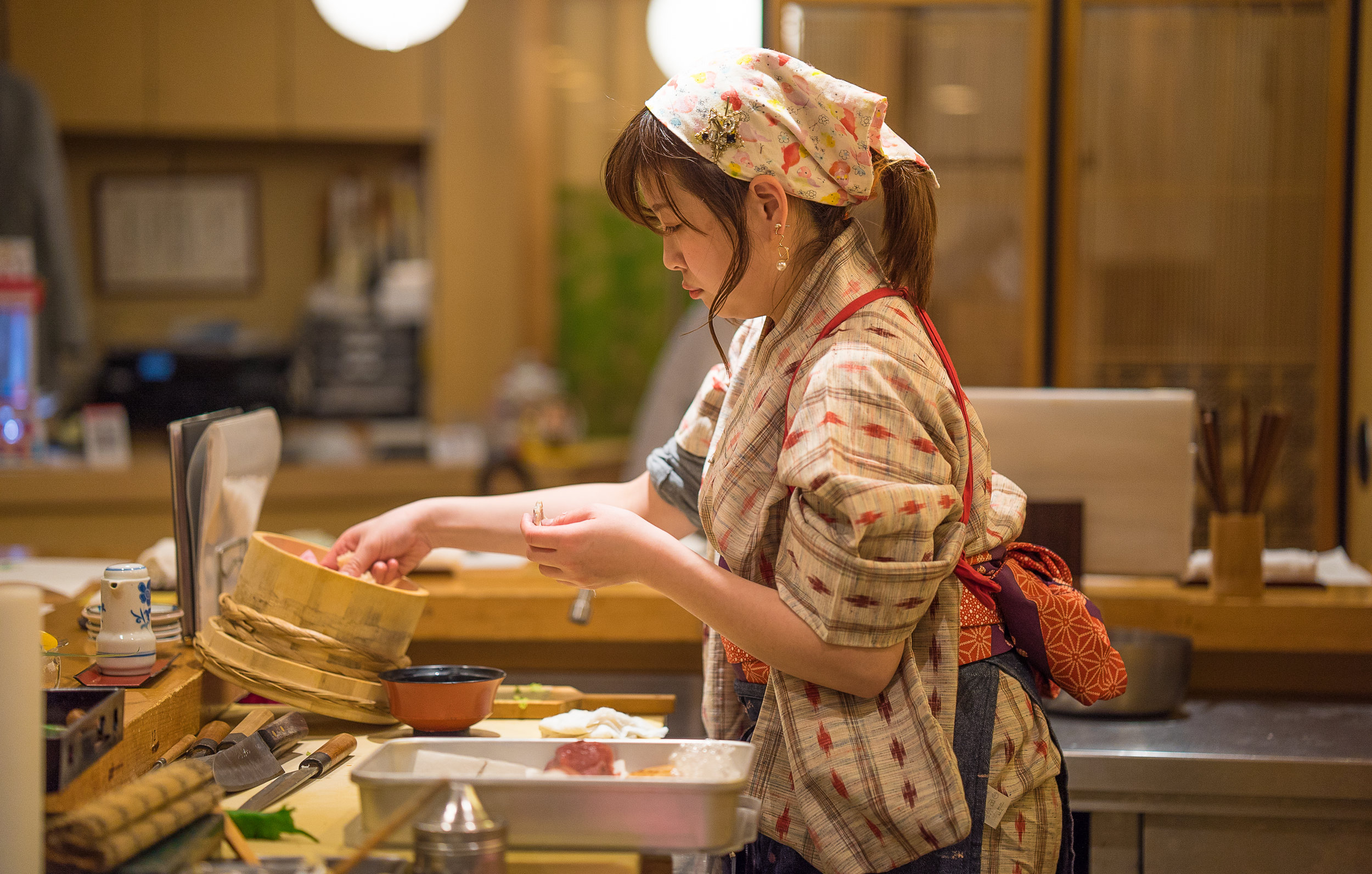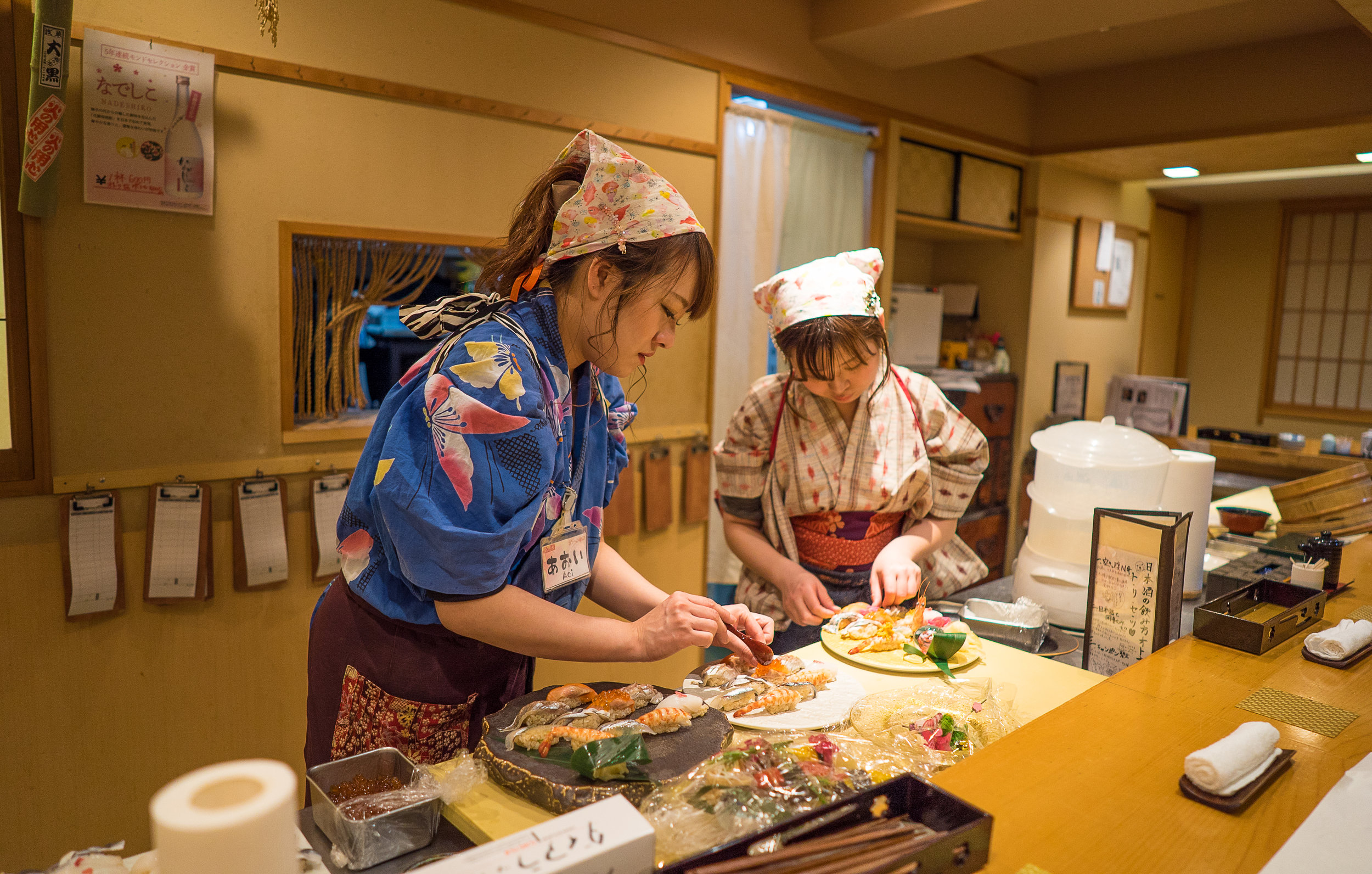Pioneering sushi chef Yuki Chizui is cutting away at Japan’s patriarchy, one sashimi at a time
On her trip to Tokyo, Malala Yousafzai visited Yuki Chizui at her restaurant, Nadeshiko Sushi, to hear about her work to advance women in the industry. After sampling some dishes, Yuki taught Malala how to make sushi in the Japanese tradition. (Courtesy of Amarachi Nwosu / Malala Fund)
Finding great sushi in Japan is easy — but a great female sushi chef? They’re as rare as the fish they serve.
So few women are formally trained in Japan as itamae (the Japanese word for chef), it’s turned Yuki Chizui — the country’s first female sushi chef — into a feminist food star.
As the manager of the all-female staffed restaurant Nadeshiko Sushi, Yuki is celebrated outside of Japan for challenging patriarchal standards. The Guardian, Food & Wine, Broadly and Eater have all featured her work. But back in Tokyo, she’s still fighting to get the respect she deserves.
Yuki prepares rice for guests at Nadeshiko Sushi. (Courtesy of Amarachi Nwosu / Malala Fund)
Yuki wraps vegetable sashimi. (Courtesy of Amarachi Nwosu / Malala Fund)
Malala and her father, Ziauddin, sampling dishes at Nadeshiko Sushi. (Courtesy of Amarachi Nwosu / Malala Fund)
In her early days as a chef when she would go to shop at Tsukiji Fish Market (where the best chefs in Tokyo buy ingredients), vendors would refuse to sell to her because she was a woman. Male chefs had to purchase fish on her behalf. But Yuki refused to accept defeat. She kept returning to the market until the vendors obliged. “Now I can purchase fish by myself, as a woman,” she says proudly.
Earning the respect of fish vendors was a small victory. Yuki has faced discrimination and scepticism throughout her decade-long career. Training to be a sushi chef in Japan is steeped in tradition and formality. According to one chef’s account, an apprentice can spend about five years performing menial tasks at a restaurant before he is even allowed to prepare food. While many women have trained at renowned schools like the Tokyo Sushi Academy, female graduates have difficulty finding apprenticeships at restaurants in Japan. They often pursue employment overseas or learn to cook other types of food, Yuki explains.
Yuki and a fellow sushi chef plate dishes to serve at Nadeshiko Sushi. (Courtesy of Amarachi Nwosu / Malala Fund)
“It was tremendously difficult for me to get here,” she reflects. “I think that women...are tied down by the rules created by male sushi chefs. This industry offers no protection to women either. You have no guaranteed place upon your return from maternity leave, for example.”
There are also the ugly myths about how being a woman can inhibit her skills as a chef — how women can’t handle raw fish because their hands are too warm or their perfume will affect their sense of taste. Of course none of these are true — yet Yuki makes a point to say she doesn’t wear perfume or nail polish.
Yuki is working to train more women to follow in her footsteps. In addition to hiring female chefs, she recently opened a school to give women the opportunity to learn sushi-making skills. As a restaurant owner, she also tries to do business with other women vendors.
But Yuki also acknowledges that Japan needs to change too and become more accepting of women in traditionally male roles in the restaurant industry and society as a whole. The World Economic Forum’s Global Gender Gap index has consistently ranked Japan low — in 2018, Japan appeared 110th out of 149 countries. Even though more women are entering the workforce, they often run up against long-held patriarchal norms later in their careers that limit opportunities for advancement.
“When I go overseas and see how much female participation there is, that I am reminded of how behind the times Japan is.”
“It’s still not widely accepted,” Yuki says when asked about how customers react to her being a sushi chef. “Funnily enough, I don’t feel the gender gap as much when I’m in Japan. It’s when I go overseas and see how much female participation there is, that I am reminded of how behind the times Japan is.”
By creating opportunities for women, Yuki is hoping to change minds — and the system. “I am here to make these new rules that allow women to flourish,” she shares. “I want female sushi chefs to prove to the world what women can do.”
Hopefully people inside Japan will start to listen to her message, too.
 Read more
Read more














